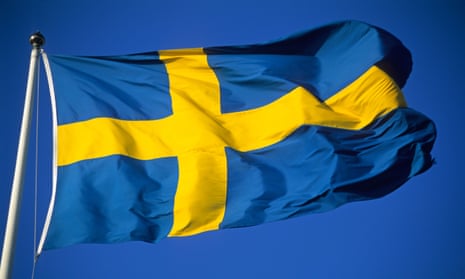The first curator was nicknamed “the masturbating Swede” after he detailed his preferred leisure activities. Others have fought with Denmark and Donald Trump, sparked outrage by asking why some people don’t like Jews, and admitted they’d rather be having sex.
After almost seven years of confusion, controversy and comedy, @sweden, the first national Twitter account to be handed, unfiltered, to a different citizen each week, will tweet its last at the end of this month, organisers have said.
Launched in 2011 to “boost interest in Sweden … and show in practice it is an open and democratic country”, the Curators of Sweden project has won multiple awards, gathered nearly 150,000 followers and has been much emulated, including by @Ireland.
“It was a groundbreaking initiative when it was launched,” said Anna Rudels, of the Swedish Institute, one of the project’s instigators. “The internet and social media have since developed at an unprecedented rate. Every project has an end, and it is time for us to move on.”
By the time the last @sweden curator tweets their final tweet on 30 September, a total of 365 ordinary residents of Sweden will have posted roughly 200,000 times to the account. Rudels said she was “truly grateful” to all of them.
Curators have been free to write whatever they want, with tweets deleted only if they broke the law, promoted a commercial brand or posed a security threat. Hate speech, trolling and personal attacks were to be avoided and other people’s views respected.
Not every stint passed without incident. In 2012 Sonja Abrahamsson, 27, from a northern village where “all people are relatives and own tractors”, sparked a storm by asking, apparently innocently: “Whats the fuzz with jews. You can’t even see if a person is a jew, unless you see their penises, and even if you do, you can’t be sure!?”
Sara Persson caused almost as much consternation in 2017 by replying, when asked what three things made Sweden unique: “We don’t believe in God. We trust state more than family. We eat sweet jam together with meat.” (The first two did not go down well with some Americans.)
In 2016, after Jenny Nguyen, a Swedish law student on an academic exchange in Hong Kong, shared some of the abuse she had been receiving, organisers said curators were increasingly being targeted, sometimes in organised campaigns, and acknowledged they could be forced to close the account as a last resort.
The following year the account found itself in trouble after adopting a list of 14,000 accounts that one curator, Vian Tahir, an online security expert, had blocked during her seven days as @sweden because she considered them “threatening to migrants, women and LGBTQ people” or having far-right or neo-Nazi links. The Swedish Institute hastily unblocked all after the list was found to include MPs, journalists, a well-known author and an ambassador.
Some curators acquitted themselves admirably amid Twitterstorms that were none of their making.
When Donald Trump told a rally last year that Sweden was “having problems like they never thought possible” after “taking in large numbers” of refugees, 22-year-old Max Karlsson defended his country diligently, beginning: “Hey Don, this is @Sweden speaking! It’s nice of you to care, really, but don’t fall for the hype. Facts: We’re ok!”
